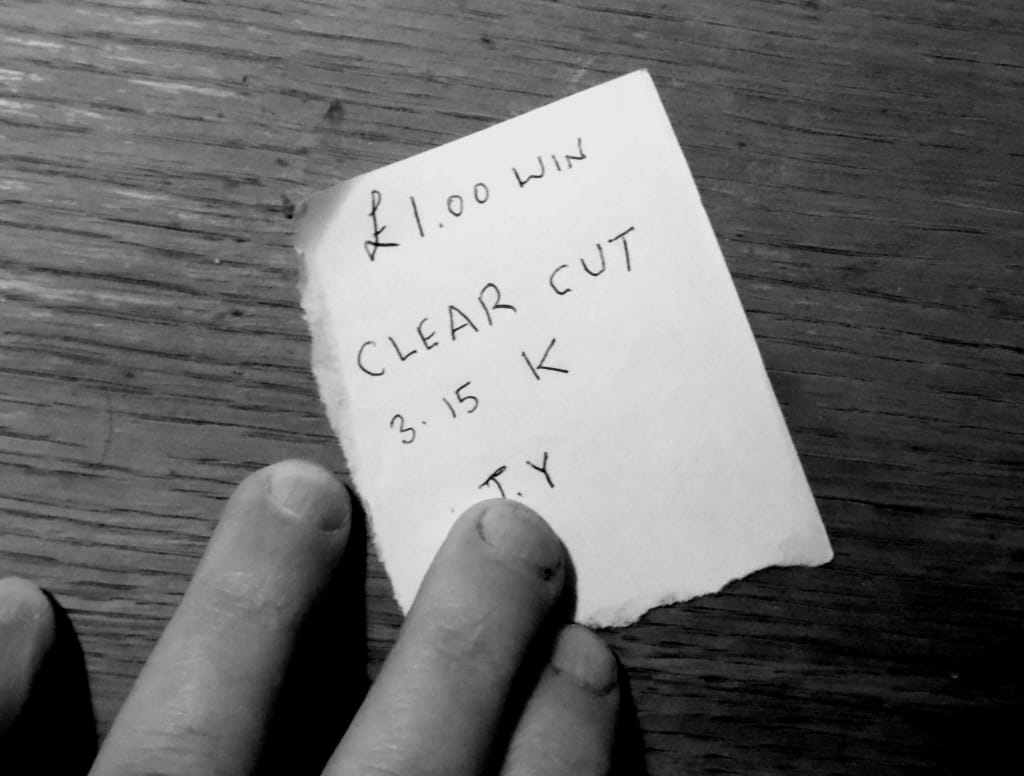
Looking back on my youth, one illicit activity I embarked upon was to enter the windowless room that served as a betting shop on Cowpen Estate where I lived, hoping I could pass myself off as being old enough to place a bet.
Before I go any further, however, re-read that opening sentence, but say the word Cowpen as Coopen, to rhyme with lupin, and your pronunciation will be in keeping with that of those local to that part of South East Northumberland. I’m happy to report that I passed the age test, and I put on a twenty-five pence double, one-half of which came in.
Betting shops back then were a world away from those of today, where technology has taken over. The bookmaker’s shop of my youth was a dark, smoke-filled chamber in which the odds and results were hand-written on boards, and bets were slid across the counter under a protective wire mesh grill.
There were no official betting slips in those days, so any old scrap of paper would serve. This could be the back of an envelope, the blank side of a chocolate wrapper, or even a square of paper torn from the bottom of an eviction notice, the recipient of which perhaps hoping that bunging his all on Saucy Jack in the 2.15 at Fontwell might bring him respite. The punter would write a nom-de-plume at the bottom of the bet, usually his or her initials.
A business-like letter
Some of my under-age friends and I started laying out small sums on regular Saturday afternoon flutters. We didn’t have much success in that enterprise though, trusting our funds entirely to horses whose names we liked the sound of.
Then one day, I was at the home of a fellow punter, and he showed me a business-like letter his father had received. Obviously, I don’t remember the precise details of the meeting, so I’ve made up the time and course, but the horse’s name and the price are correct. The body text came straight to the point. It read:
Clear Cut will win the 3.15 at Kempton Park on March 15th.
The letter went on to say that the price of the horse would be around six-to-one and that it would win by about half a length. It then demanded the reader keep the information to himself, and not tell anyone about this sure thing. When I got home, I immediately passed on the tip to those members of my family who liked to invest in a Saturday bet. Their responses ranged from enthusiastic to derisory, and I was quite skeptical myself.
But when the day of the race came, my friends and I didn’t dare let Clear Cut pass us by, and I invested to the tune of a one pound note. The horse romped home by half a length, at a price of thirteen-to-two. We were delighted, and due to how uncannily accurate the letter’s prediction had been, convinced that horse racing was a rigged racket. As an aside, that same day I picked out a horse in another race called Bear’s Paw, again because I liked the name, and it came in for me at a sweet sixteen-to-one.
Back home, smoking king-size cigarettes and soaking up plaudits from those who had taken my tip, I wondered how the prediction could have come about. Which was the scam, the letter or the race itself?
Of course, it was the letter. Although in my naivety I was impressed at the professional nature of the prediction, and it was profitable for me to be so, it was all part of a fiddle in which my friend’s father just happened to have been sent a winner. He could just have easily been sent the name of the last horse home.
Mail order prophet
The pre-Internet scam of sending letters that predict winners in sporting events and suchlike was very well illustrated in an episode of Alfred Hitchcock Presents from 1955, called Mail Order Prophet. In this story (spoiler alert), office drudge Ronald Grimes, played by E G Marshall, receives a letter predicting the outcome of a local mayoral election.
The sender of the letter, a mysterious Mr Christiani, states that he has unique powers that allow him to see into the future, adding that he is not allowed to use those powers to his own benefit. Grimes is discouraged by his skeptical colleague George, played by Jack Klugman, and so he tears up the letter. The election prediction comes true but is passed off as pure luck.
More letters follow though, and each proves accurate. Grimes starts putting money on the predictions with great success, and, following a huge killing on the stock market via a Christiani tip, he retires to warmer climes. His bewildered colleague George tries to track down Christiani, only to learn that he is in jail for fraud. A postal investigator explains to him how the scam works.
The investigator gives the example that Christiani sends out 4,000 letters, half of which predict Mayor Twist will win the election, and the other half predicting a win for his rival Hatton. That means 2,000 people witness an accurate prediction.
Christiani then sends those 2,000 a tip for the big fight, half saying the champ will win, and the rest predicting victory for the unfancied challenger. After the underdog wins, Christiani has a list of 1,000 people who are starting to believe in his powers. After a couple more letters, the list is down to 125, but these are now convinced of Christiani’s infallibility. At this point, the fraudster puts the bite on and asks for cash.
The letter my friend’s father got didn’t work precisely on that basis, as there were more than two entrants in the race, but it ran along similar lines. The popular TV rogue Arthur Daley ran a similar scam in an episode of Minder once, using four telephone booths as the base for the project.
I stopped gambling many years ago. My system of choosing horses whose names I liked gave way to one of following my gut instinct. It was not a profitable endeavor.
If you’re curious, you can watch Mail Order Prophet here.
https://www.dailymotion.com/video/x54o1iu
(article originally published in Medium)
About the Creator
Joe Young
Blogger and freelance writer from the north-east coast of England






Comments
There are no comments for this story
Be the first to respond and start the conversation.